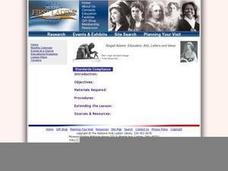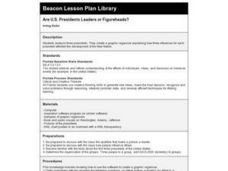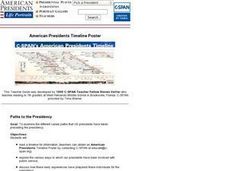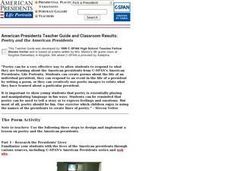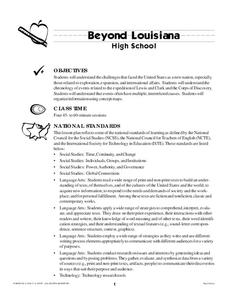Curated OER
Meet the Corps of Discovery
Students assume the persona of one of the members of Lewis and Clark's expedition team. They research a member of the expedition team, write a first-person introduction of that team member, and share that introduction in a 2-3 minute...
Curated OER
The Presidential Nominating System
Students examine the process by which candidates for U.S. president are nominated by the Democratic and Republican parties. They identify the differences between primaries and caucuses and key terms and issues related to the primary...
Curated OER
New $1 Coins Honor U.S. Presidents
Elementary schoolers examine money, then read a news article about new coins being produced by the U.S. Mint. The teacher introduces the article with samples of American money and a vocabulary activity, then students read the news piece...
Curated OER
U.S. Mint Releases New Jefferson Nickel
Students share their knowledge of Lewis and Clark, then read a news article about the redesign on the U.S. nickel to commemorate Lewis and Clark's expedition. Introduce the article with a discussion and vocabulary activity, then students...
Curated OER
The First American Party System: Events, Issues, and Positions
Students identify factors which lead to the development of the Federalists and Democratic-Republicans. They examine the writings of Thomas Jefferson and Alexander Hamilton as well. They discuss what elements are needed for an orgainized...
Curated OER
Rollin' Down the River
Students examine the contributions of Lewis and Clark. In this Louisiana Purchase lesson, students research Internet and print sources regarding the Lewis and Clark expedition.
Curated OER
U.S. History: Chapter 11, Sections 1 & 2
Reviewing American history from 1818 - 1832 (chapter 11 of an unspecified textbook), this presentation includes key terms and ideas about the era of Jeffersonian politics and the election of John Adams. The slides are in all caps, making...
Curated OER
Being Me in the Face of Adversity - Americans Who Stood Up for Their Beliefs
Students identify important Americans from the colonial, revolutionary and slavery periods who are noted for standing up for their beliefs in the face of peer disapproval. They identify the importance of music in motivating and...
Curated OER
Foundations of American Government: Teacher’s Guide
Students explore the foundations of America. In this early American history lesson, students watch Discovery video segments regarding the Boston Massacre, the Declaration of Independence, the U.S. Constitution, and the Bill of Rights....
Curated OER
President's Day Scramble
In this President's Day worksheet, learners review presidential history as they read a sentence about each president and unscramble words in each of the sentences.
Curated OER
Judicial Review
Student demonstrate understanding of both sides of the argument between Jefferson and Marshall that led to the strengthening of the Judicial Branch through the creation of judicial review. Unit is comprised of five lessons and fits into...
Curated OER
The Declaration of Independence
Pupils begin their examination of the Declaration of Independence. Using the text, they answer questions for their citizenship interview. They also examine the role of Jefferson in creating the document and how he participated in slavery.
Curated OER
Philadelphia's Important Contribution to the Lewis and Clark Expedition
Students analyze a primary source document (Jefferson's secret letter to Congress) and identify its objectives through the aid of focus questions. They complete a graphic organizer and write an article summarizing Philadelphia's...
National First Ladies' Library
Jefferson's Legacy: A National Library
Learners examine the creation of the Library of Congress. They investigate reasons why Thomas Jefferson sold his personal collection to the Library. Employing various research resources, students write newspaper articles about the sale...
Humanities Texas
Primary Source Worksheet: “Report on Manufacturers,” Annals of Congress
Invite your learners to take a look at life during the term of United States president George Washington through analysis of an interesting primary source. The document summarizes American manufacturing capacities, as detailed...
Curated OER
Vocab-u-lous! Build a Fabulous Vocab
In this vocabulary worksheet, students select the best word choice to complete the sentence. All words correspond to the theme of Presidents' Day.
Curated OER
Are U.S. Presidents Leaders or Figureheads?
Fifth graders, using a graphic organizer, analyze three presidents.
Curated OER
Using Primary Sources: Letters from the Presidents
Students research the life of a president by reading personal letters on the American Presidents web site, and explore the ways that the character and personality of the president affected the ways they handled historical events.
Curated OER
Paths to the Presidency
Seventh graders investigate a timeline of the career paths that US presidents took before they became the president. They how these career choices prepared these men for the presidency.
Curated OER
Poetry and the American Presidents
Fifth graders choose a poetry activity in order to focus their research about American presidents.
Curated OER
American Presidents
In this American Presidents worksheet, 8th graders match 21 presidents with matching statements about events during their presidency. A reference web site is given for additional activities
Curated OER
Beyond Louisiana
Eleventh graders examine the challenges that faced United States as a new nation. In this American History lesson, 11th graders study the chronology of events leading up to the expedition of Lewis and Clark. Students organize...
Curated OER
The Declaration of Independence (1776)
In this online interactive history worksheet, students respond to 10 short answer and essay questions about the Declaration of Independence.
Curated OER
Jefferson vs. Franklin: Renaissance Men
Students list a variety of interests and achievements of Franklin and Jefferson. They take a position that one or the other's interests and achievements were more wide-ranging or that they were equivalent. They write out their findings.















